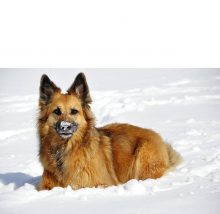Crisp winter days seem to invigorate our dogs and send our cats in search of the warmest, sunniest spots in the house. But winter presents additional challenges for senior pets. Check out the winter pet safety tips below to keep your senior dog or cat safe and comfortable through the chilly weeks ahead.
- Don’t’ leave pets outdoors or in cars. If it’s too cold for you to be out, it’s likely too cold for your senior dog or cat as well. It is a myth that simply because they have fur, pets can withstand the cold better than humans. Dogs and cats can suffer from frostbite and hypothermia. Older pets are even more vulnerable to cold weather.
- Provide warm, supportive beds for dogs and plush, cup-style beds for cats. Locate your pet’s bed in a favored draft-free spot.
- Use supportive slings and provide steps to help pets with restricted mobility reach their favorite couches and beds, where they can be more comfortable than hard, drafty floors.
- Take extra precautions with chemical hazards such as antifreeze and ice-melt products. Inspect under vehicles for fluid leaks, and check containers of stored product to ensure there are no leaks from packaging.
- Pay extra attention to heat sources that attract cats and other small animals, such as car wheel wells and engine compartments, household radiators, space heaters, and fireplaces. Rap several times on your car hood or honk the horn before starting the engine in winter. Use a fireplace screen to minimize the chance of sparks landing outside of the fireplace. Monitor pets sleeping close to heat sources to be sure their fur is not too close to hot surfaces.
- Dry wet fur when your dog or cat returns indoors. Wipe off their underbellies, legs, and paws; check foot pads for cracks or irritation from road salt and ice melting chemicals. Applying coconut oil to dry, cracked pads may help.
- Use sweaters & coats – Aging dogs have difficulty regulating their body temperature in both cold and warm weather. Sweaters or coats can provide additional insulation to retain warmth in winter. Keep in mind that small dogs lose body heat more quickly than larger dogs. And although sweaters and coats provide added warmth, your dog’s paws, ears, and respiratory tract are still exposed to the frigid air, so limit time outdoors in colder temperatures.
- Never shave dogs’ coats down to the skin in winter. Keep them brushed to avoid matted coats, which can interfere with the ability to regulate body temperature.
- Check for packed snow in foot pads. While playing with your dog in snow, check periodically to remove packed snow and ice between the foot pads. Especially in dogs with longer hair between the foot pads, snow tends to pack and harden into hard balls of ice that cling to the fur, making walking painful. Trimming extra hair between your dog’s foot pads may help minimize the likelihood of snow packing there.
- Watch dogs off leash closely, especially near ponds and lakes that freeze. Dogs can easily fall through breaking ice, but it’s difficult for them to get out on their own.
- Locate cat litter boxes in warm, secluded spots indoors, rather than cold, drafty basements or garages.
- Lock up medications – With it being cold and flu season for humans, there may be more medications around the house, and they can be deadly for pets. Acetaminophen can be extremely toxic to dogs and cats. Aspirin toxicity is severe in cats and can cause ulcers in dogs. Be sure to lock away all prescription and over-the-counter medications safely out of reach of pets. If you have visitors, ask them to do the same and keep their luggage zipped.
- Aging dogs and cats benefit from regular exercise, but take extra care with older pets. Enjoy some walking to warm up before throwing a toy to minimize the chance of strain or injury. If your dog displays reluctance to continue a walk, turn back and return home to avoid over-exertion.
- Consult with your veterinarian about alternative and complementary care. Consider supplements that may help your aging pet, such as glucosamine and fish oil. Look into acupuncture, homeopathy, and chiropractic therapy to relieve arthritis pain. For advanced arthritis and joint pain, veterinary non-steroid anti-inflammatory drugs (NSAIDs) can be life-changing, but work with your veterinarian to understand and minimize the associated risks.
- Keep a check on indoor air quality for both you and your pets. Change air filters regularly. Be sure to have carbon monoxide detectors operating in your home. Never allow your car to run in the garage, as the fumes can easily enter the house.
- Stay well hydrated. Ensure your senior dog or cat always has access to a plentiful supply of fresh, clean drinking water to help keep them hydrated.
